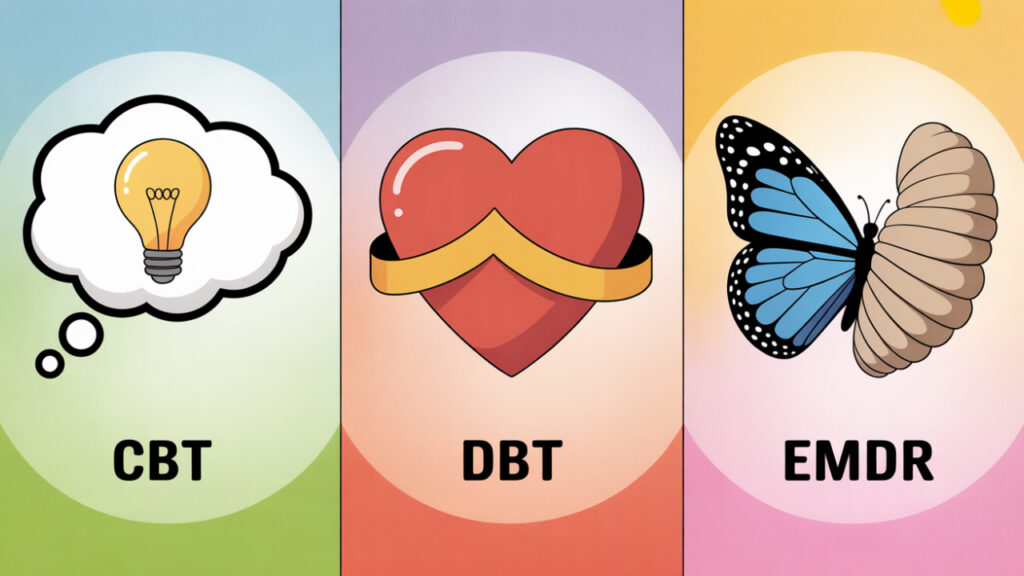CBT vs DBT vs EMDR: Which Therapy Works Best?
Understanding the Core of CBT, DBT, and EMDR
When comparing CBT vs DBT vs EMDR, the first step is understanding how each therapy works. Cognitive Behavioral Therapy (CBT) focuses on thoughts, behavior, and problem solving. Dialectical Behavior Therapy (DBT) builds on CBT with dialectic principles, adding emotion regulation and distress tolerance. Eye Movement Desensitization and Reprocessing (EMDR) uses eye movements or bilateral stimulation to target traumatic memory and reduce distress.
Each therapy addresses mental health from a different angle. CBT emphasizes cognitive restructuring to change negative thought patterns. DBT emphasizes acceptance, distress tolerance, and skills for coping with emotional dysregulation. EMDR emphasizes desensitization, memory reprocessing, and healing the mind from trauma.
CBT: A Structured Approach to Change
CBT helps patients recognize how thought patterns drive emotions and behavior. Therapists guide individuals through identifying negative thoughts, challenging them, and practicing healthier replacements. This process reduces suffering from anxiety, depression, panic, or stress.
CBT often includes exposure therapy for phobias or anxiety disorder. Patients face feared situations gradually while learning coping skills. CBT also supports recovery from substance abuse and addiction by teaching healthier coping strategies.
Key Features of CBT
- Focuses on present thought and behavior
- Uses structured therapy sessions with goals
- Effective for anxiety, depression, bipolar disorder, insomnia, and eating disorders
CBT’s structured nature helps with problem solving, anger management, and stress management. A mental health professional may combine CBT with medication under psychiatry care for improved health outcomes.

DBT: Expanding CBT with Emotional Skills
DBT is a form of dialectical behavior therapy originally created for borderline personality disorder. It blends CBT’s cognitive restructuring with dialectical acceptance. Patients learn mindfulness, distress tolerance, and emotion regulation skills.
DBT also emphasizes interpersonal effectiveness and healthier communication. This makes DBT effective for those coping with domestic violence, relationship stress, or couples therapy needs. Skills training helps reduce emotional dysregulation, suicidal ideation, and impulsive behavior linked to personality disorder.
Core Elements of DBT
- Individual therapy with a mental health professional
- Group skills training on mindfulness, acceptance, and distress tolerance
- Emphasis on regulation of mood, anger, and fear
DBT is often recommended for patients struggling with mental disorder complexity. It helps with trauma, substance abuse, and even eating or alcohol problems. Mental health treatment may combine DBT with medication, exercise, or meditation for long-term recovery.
EMDR: Healing Memory Through Desensitization
EMDR targets traumatic memory that continues to cause mental distress. A therapist uses guided eye movements or bilateral stimulation while patients recall painful memory. Over time, this desensitization reduces suffering and rewires the brain’s response.
EMDR research supports its use in PTSD, abuse recovery, and trauma-related anxiety. Unlike CBT or DBT, EMDR focuses less on thought and behavior and more on memory processing. Patients often report reduced fear, grief, and panic after treatment.
How EMDR Works
- Therapist guides patient to recall distressing memory
- Eye movement or other bilateral stimulation activates brain processing
- Memory becomes less distressing over time
EMDR connects memory with adaptive thought, reducing pain and emotional suffering. It is also used alongside exposure therapy, brainspotting, or other modalities. Mental health professionals may combine EMDR with psychiatry services or medication depending on patient needs.

Comparing CBT vs DBT vs EMDR
The main difference between CBT, DBT, and EMDR lies in their goals. CBT emphasizes thought and behavior. DBT emphasizes dialectic acceptance and emotional coping. EMDR emphasizes memory processing and desensitization.
For anxiety disorder or depression, CBT is often the first recommendation. For borderline personality disorder, DBT is the evidence-based choice. For trauma or abuse, EMDR provides rapid relief through memory reprocessing.
Insurance often covers all three therapies, though patients may need to confirm coverage with providers. Motivation, therapy goals, and personal preference influence which method works best.
Similarities Across All Three
- Evidence-based research supports each method
- Involves a therapist or mental health professional
- Improves mood, coping, and emotional regulation
- Addresses stress, mental distress, and suffering
Each therapy strengthens awareness, coping, and regulation of mind and emotion. They can be combined depending on mental health conditions, substance abuse, or dual diagnosis.
When CBT Is Most Effective
CBT is most effective for patients dealing with anxiety, depression, bipolar disorder, or insomnia. It is also valuable for anger management, stress management, or problem solving.
CBT works well for patients motivated to change thoughts and behavior. It is also commonly used in addiction recovery, where coping and relapse prevention are critical. Therapists often recommend CBT alongside exercise, sleep hygiene, or medication.
When DBT Is Most Effective
DBT is most effective for borderline personality disorder, emotional dysregulation, or suicidal ideation. Patients who experience mood swings, anger, and distress benefit from DBT skills.
It is also effective for couples therapy, parenting stress, or domestic violence survivors. DBT provides structured tools for emotion regulation, distress tolerance, and acceptance. For many patients, DBT improves relationships, reduces violence risk, and supports long-term health.
When EMDR Is Most Effective
EMDR is most effective for trauma, abuse, grief, or PTSD. Patients with injury, violence exposure, or domestic abuse often respond quickly to EMDR.
It is also useful when memory drives ongoing suffering, fear, or panic. EMDR reduces mental distress without requiring patients to describe trauma in detail. This makes it appealing for those with trauma-related anxiety disorder, depression, or substance abuse history.
CBT, DBT, and EMDR in Addiction Treatment
Substance abuse and alcohol use often co-occur with mental disorder. CBT helps patients recognize triggers and replace destructive thought with healthier choices. DBT helps patients regulate emotion, manage distress, and build motivation to avoid relapse. EMDR helps patients heal memory of trauma linked to addiction.
In addiction treatment, combining CBT vs DBT vs EMDR can provide balance. Patients gain coping skills, process memory, and regulate emotion. Insurance may cover therapy within structured programs, and mental health treatment often includes psychiatry, medication, and support from a social worker.
Revival Mental Health and Therapy Options
At Revival Mental Health, patients receive therapy that addresses behavior, memory, and emotion. Our treatment center in Orange County provides CBT, DBT, and EMDR options. We focus on the mind, brain, and emotional regulation through individualized plans.
Our mental health professionals help patients manage anxiety disorder, bipolar disorder, borderline personality disorder, and addiction. We provide couples therapy, grief support, and stress management. Patients also receive support for anger management, parenting, and recovery from abuse or domestic violence.
Integrating Additional Supports
Therapy is most effective when combined with holistic health strategies. Exercise, meditation, and sleep improve mood and reduce distress. Patients often benefit from mindfulness, acceptance, and problem solving skills.
Mental health treatment may include psychiatry for medication management. Collaboration between therapist, health professional, and social worker improves patient outcomes. Support groups and coping resources enhance regulation, motivation, and long-term recovery.
Research and Future Directions
Research continues to expand evidence for CBT, DBT, and EMDR. Studies highlight their efficacy for depression, anxiety disorder, schizophrenia, and trauma. Each therapy contributes to improved quality of life, reduced suffering, and emotional stability.
Neurodiversity and brain research further refine these methods. Awareness of memory, thought, and emotion regulation continues to grow. Patients gain insight, motivation, and coping skills to improve health outcomes.
Final Thoughts
CBT, DBT, and EMDR all provide pathways to better mental health. Each therapy addresses unique patient needs, from cognitive restructuring to distress tolerance to desensitization of memory.
Choosing CBT vs DBT vs EMDR depends on patient goals, conditions, and therapy preferences. A mental health professional can provide guidance on which therapy or combination is best. Recovery involves coping, acceptance, and motivation—supported by therapist expertise and evidence-based practice.

FAQs
1. Can CBT, DBT, and EMDR be combined in one treatment plan? Yes, many therapists integrate elements of all three therapies. This combination helps patients address thought, emotion, and memory together.
2. How long does EMDR therapy usually take? EMDR often requires fewer sessions than CBT or DBT. Some patients report progress in under 10 sessions, though trauma complexity matters.
3. Is DBT only for borderline personality disorder? No, DBT also benefits patients with depression, eating disorders, or substance abuse. Its skills in distress tolerance and mindfulness apply broadly.
4. Does insurance cover CBT, DBT, and EMDR? Most insurance providers cover these evidence-based therapies. Coverage may depend on diagnosis, provider network, and individual policy.





